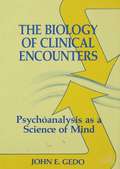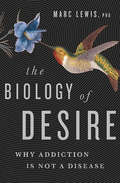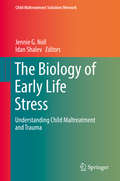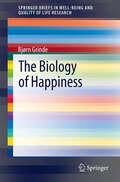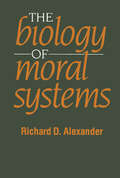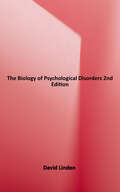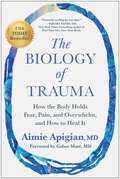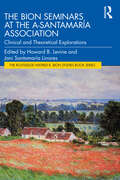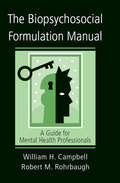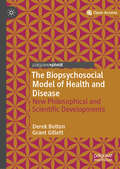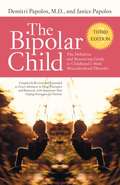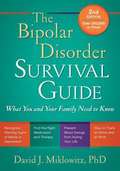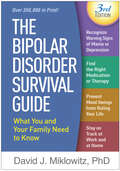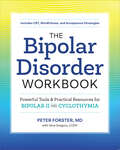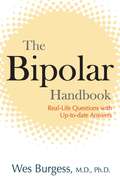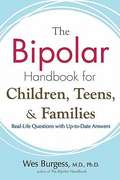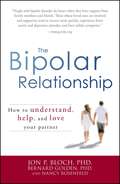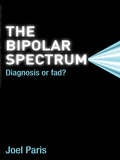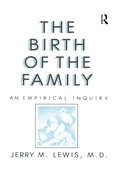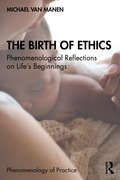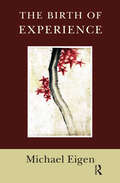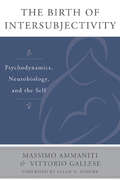- Table View
- List View
The Biology of Clinical Encounters: Psychoanalysis as a Science of Mind
by John E. GedoIn The Biology of Clinical Encounters, Gedo utilizes recent findings in neuroscience and cognitive psychology to elaborate his conception of psychobiology and to consider its implications in clinical analysis. He pursues this challenging undertaking in several directions. He illuminates the way in which psychobiology enters into his hierarchical model of mental functioning, and goes on to examine three clinical syndromes - phobias, obsessions, and affective disturbances - in which biological considerations are particularly important. Of special note are chapters examining the implications of a biological approach for clinical psychoanalysis. Gedo explores the notion of transference that grows out of attentiveness to psychobiological factors, elaborates the concept of therapeutics that follows from looking beyond mental contents, and discusses the problem of assessing clinical evidence produced by analyses informed by a psychobiological orientation. Drawing on his own analytic work of over three decades, he compares analyses conducted with a psychobiological orientation with the outcome of analyses conducted earlier in his career with a more traditional psychological approach. A stimulating introduction to the interpenetration of the biological and the psychological in clinical work, The Biology of Clinical Encounters is quintessential Gedo: scholarly in conception, elegant in tone, provocative in import, and illuminating, always, of fundamental issues about the status of psychoanalysis as a science of mind.
The Biology of Desire: Why Addiction Is Not a Disease
by Marc LewisA renowned neuroscientist provides an &“unorthodox but enlightening&” (Wall Street Journal) narrative of how addiction happens in the brain, and what we can do to overcome it Through the vivid, true stories of five people who journeyed into and out of addiction, a renowned neuroscientist—and former addict himself—explains why the disease model of addiction is wrong and how it obstructs the path to recovery. Combining intimate human examples with clearly rendered scientific explanations, The Biology of Desire is enlightening and optimistic reading for anyone who has wrestled with addiction either personally or professionally.
The Biology of Early Life Stress: Understanding Child Maltreatment and Trauma (Child Maltreatment Solutions Network)
by Jennie G. Noll Idan ShalevThis innovative collection extends the emerging field of stress biology to examine the effects of a substantial source of early-life stress: child abuse and neglect. Research findings across endocrinology, immunology, neuroscience, and genomics supply new insights into the psychological variables associated with adversity in children and its outcomes. These compelling interdisciplinary data add to a promising model of biological mechanisms involved in individual resilience amid chronic maltreatment and other trauma. At the same time, these results also open out distinctive new possibilities for serving vulnerable children and youth, focusing on preventing, intervening in, and potentially even reversing the effects of chronic early trauma.Included in the coverage:Biological embedding of child maltreatmentToward an adaptation-based approach to resilience Developmental traumatology: brain development and maltreated children with and without PTSDChildhood maltreatment and pediatric PTSD: abnormalities in threat neural circuitryAn integrative temporal framework for psychological resilienceThe Biology of Early Life Stress is important reading for child maltreatment researchers; clinical psychologists; educators in counseling, psychology, trauma, and nursing; physicians; and state- and federal-level policymakers. Advocates, child and youth practitioners, and clinicians in general will find it a compelling resource.
The Biology of Happiness
by Bjørn GrindeThe briefs presents a model for happiness based on current knowledge in evolutionary biology and neurobiology. Briefly, the primary purpose of nervous systems is to direct an animal toward behaviour relevant for survival and procreation. In primitive animals actions are based on reflexes, while in humans the modules directing behaviour engage positive and negative affect (good and bad feelings), and they are swayed by cognitive processes. The reason why evolution opted for this strategy was the improved flexibility in response - i.e., we learn from previous experiences. The human capacity for happiness is an accidental consequence. An array of brain modules has evolved to care for various pursuits, but recent studies suggest that they converge on shared neural circuits designed to generate positive and negative mood. Happiness can be construed as the net output of the relevant modules. The briefs suggests a strategy for how to avoid having negative feelings (such as anxiety, depression and chronic pain) dominate the mind, and how to exercise positive feelings. In short, the book offers both a deeper understanding of what happiness is about, and a framework for improving well-being. An array of brain modules has evolved to care for various pursuits, but recent studies suggest that they converge on shared neural circuits designed to generate positive and negative mood. Happiness can be construed as the net output of the relevant modules. The book suggests a strategy for how to avoid having negative feelings (such as anxiety, depression and chronic pain) dominate the mind, and how to exercise positive feelings. In short, the book offers both a deeper understanding of what happiness is about, and a framework for improving well-being.
The Biology of Moral Systems
by Richard AlexanderFirst published in 1987, this book discusses the life and natural history of moral systems as seen through the eyes of a biologist. The volume offers a comprehensive introspective of the biology of a moral system by examining the evolutionary approach from perspectives of sociobiology and ideology. Morality in relation to conflicts and confluences of interest among humankind are further evaluated, with particular emphasis on the human psyche and the ontogeny of moral behaviour. Philosophical meets biological with insightful commentary on the morality of law and democracy. The book concludes with an epilogue, bibliography and name and subject index. It is clear, concise and contemporary and would be of use to those studying Biology, Philsophy and many other social sciences.
The Biology of Psychological Disorders
by David LindenThis textbook introduces the reader to some of the most common psychological disorders, from schizophrenia, depression, and substance abuse to disorders of childhood, adolescence, and aging. Coverage of these disorders is combined with a comprehensive grounding in the fundamentals of neurobiology and the principles of psychopharmacology that underpin their treatment. Written by David Linden, Scientific Director at the School of Mental Health and Neuroscience at Maastricht University, The Biology of Psychological Disorders sits at the intersection psychology, psychiatry, biology and neuroscience. Aimed primarily at undergraduate psychology students, it is also of relevance to trainee psychiatrists and clinicians. New to this Edition: - Two completely new chapters on the immune system and mental health, and environmental influences on brain development - Incorporates recent advances in genetics and psychopharmacology - Updated chapters under the DSM-5 - Discusses biological aspects of psychological interventions and psychological disease models - Suitable for neuroscience curriculum for trainee psychiatrists - New ‘controversies’ feature that promotes critical thinking skills by exploring the validity of disease concepts and evidence bases
The Biology of Trauma: How the Body Holds Fear, Pain, and Overwhelm, and How to Heal It
by Aimie ApigianThis groundbreaking book breaks down the latest research to reveal how trauma impacts our bodies on a cellular level and offers an empowering path to whole-body healing.Today, we know more about mental health than ever before, but traditional medicine still mistakes subtle signs of trauma for stress, anxiety, or chronic disease—sometimes even retraumatizing patients with outdated and misguided methods. Treatment plans that focus on the mind are only addressing the downstream effects. Likewise, common medical approaches to manage symptoms fail to explore root causes and promote genuine recovery. If we want to truly heal, we need to understand trauma as something happening inside of the body—not as a singular external event. Gaining clarity on how our bodies hold onto experiences, impacting both our physical health and our ability to maintain healthy behaviors and relationships, is crucial. That&’s where Dr. Aimie Apigian&’s integrative, revolutionary approach comes in. With a decade of clinical research, approachable storytelling, and real-life examples, The Biology of Trauma will show you: How the body absorbs scarring experiences and overwhelm Ways to identify commonly overlooked trauma symptoms like lethargy, fogginess, and unexplained worry Recognize how emotional pain stored in the body affects overall health on a cellular level, even for people with functionally successful lives Prevent trauma-induced changes in your biology that suppress the cycle of recovery Work with your nervous system to safely heal—without risk of retraumatization Perfect for both individuals seeking personal growth and health professionals improving their practice, The Biology of Trauma will help you gain deep insights into your own mind, body, and healing journey.
The Bion Seminars at the A-Santamaría Association: Clinical and Theoretical Explorations (The Routledge Wilfred R. Bion Studies Book Series)
by Howard B. LevineThe Bion Seminars at the A-Santamaria Association offers readers insightful analyses and commentaries on Bion’s key papers and books, as well as providing a unique set of discussions and explorations of many of Bion’s central concepts and foundational texts.This diverse collection of essays brings together contributions from internationally renowned Bionian scholars and analysts, including Annie Reiner, Nicola Abel-Hirsch, Antònia Grimalt, Avner Bergstein, Afsaneh Kiany Alisobhani, João Carlos Braga, Tom Helscher, Tim Smith and Peter Goldberg. Readers will encounter expansions and extensions of contemporary and timeless themes and discover the originality with which psychoanalysts from different geographical regions take ownership of the ideas discussed. Chapters cover the early and late work of Bion, spanning topics such as arrogance, the theory of thinking, memory and desire, and the clinical importance of frustration. The authors reveal to us the elements of continuity and discontinuity in Bion's work, sharing open conjectures to allow new developments to evolve.This volume is essential reading for practicing psychoanalysts, analysts-in-training, analytic psychotherapists, and anyone interested in exploring Bion's work.
The Biopsychosocial Formulation Manual: A Guide for Mental Health Professionals
by William H. Campbell Robert M. RohrbaughBased on George Engel’s model, The Biopsychosocial Formulation Manual presents ways to help psychiatry residents and students effectively gather and organize patient data to arrive at a complete mental health history in a limited timeframe. While most current models only take one factor into account, Campbell and Rohrbaugh emphasize and analyze three essential components (biological, social, and psychological). The process of identifying pertinent data for each component of the biopsychosocial formulation is explicated in detail. A separate section outlines how to use the biopsychosocial formulation to generate treatment recommendations. This volume includes a complete package for practicing the biopsychosocial method; this easy-to-use guide includes a data record sheet and downloadable resources to facilitate organization and assessment, appealing to both the psychiatric professional and the trainee.
The Biopsychosocial Model of Health and Disease: New Philosophical and Scientific Developments
by Grant Gillett Derek BoltonThis open access book is a systematic update of the philosophical and scientific foundations of the biopsychosocial model of health, disease and healthcare. First proposed by George Engel 40 years ago, the Biopsychosocial Model is much cited in healthcare settings worldwide, but has been increasingly criticised for being vague, lacking in content, and in need of reworking in the light of recent developments. The book confronts the rapid changes to psychological science, neuroscience, healthcare, and philosophy that have occurred since the model was first proposed and addresses key issues such as the model’s scientific basis, clinical utility, and philosophical coherence. The authors conceptualise biology and the psychosocial as in the same ontological space, interlinked by systems of communication-based regulatory control which constitute a new kind of causation. These are distinguished from physical and chemical laws, most clearly because they can break down, thus providing the basis for difference between health and disease. This work offers an urgent update to the model’s scientific and philosophical foundations, providing a new and coherent account of causal interactions between the biological, the psychological and social.
The Bipolar Child (Third Edition): The Definitive and Reassuring Guide to Childhood's Most Misunderstood Disorder
by Demitri Papolos M.D. Janice PapolosSince it first appeared on bookshelves, The Bipolar Child has made an indelible mark on the field of psychiatry and has become the resource that families rely upon. Now, with more than 200,000 copies sold, the first book about early-onset bipolar disorder is completely revised and expanded.Bipolar disorder—manic depression—was once thought to be rare in children. Now researchers are discovering not only that bipolar disorder can begin early in life, but that it is much more common than ever imagined. Yet the illness is often misdiagnosed and mistreated with medications that can exacerbate the symptoms. Why? Bipolar disorder manifests itself differently in children than in adults, and in children there is an overlap of symptoms with other childhood psychiatric disorders. As a result, these kids may be labeled with any of a number of psychiatric conditions: “ADHD,” “depression,” “oppositional defiant disorder,” “obsessive-compulsive disorder,” or “generalized anxiety disorder.” Too often they are treated with stimulants or antidepressants—medications that can actually worsen the bipolar condition.Since the publication of its first edition, The Bipolar Child has helped many thousands of families get to the root cause of their children’s behaviors and symptoms and find what they need to know. The Papoloses comprehensively detail the diagnosis, explain how to find good treatment and medications, and advise parents about ways to advocate effectively for their children in school. In this edition, a greatly expanded education chapter describes all the changes in educational law due to the 2004 reauthorization of IDEA (Individuals with Disabilities Education Act), and offers a multitude of ideas for parents and educators to help the children feel more comfortable in the academic environment. The book also contains crucial information about hospitalization, the importance of neuropsychological testing (with a recommended battery of tests), and the world of insurance. Included in these pages is information on promising new drugs, greater insight into the special concerns of teenagers, and additional sections on the impact of the illness on the family. In addition, an entirely new chapter focuses on major advances taking place in the field of molecular genetics and offers hope that researchers will better understand the illness and develop more targeted and easier-to-tolerate medicines.The Bipolar Child is rich with the voices of parents, siblings, and the children themselves, opening up the long-closed world of the families struggling with this condition. This book has already proved to be an invaluable resource for parents whose children suffer from mood disorders, as well as for the professionals who treat and educate them, and this new edition is sure to continue to light the way.
The Bipolar Disorder Survival Guide, Second Edition
by David J. MiklowitzGetting an accurate diagnosis is the first step toward reclaiming your life from bipolar disorder. But if you or someone you love is struggling with the frantic highs and crushing lows of this illness, there are still many hurdles to surmount at home, at work, and in daily life. You need current information and practical problem-solving advice you can count on. You've come to the right place. * How can you distinguish between early warning signs of bipolar mood swings and normal ups and downs? * What medications are available, and what are their side effects? * What should you do when you find yourself escalating into mania or descending into depression? * How can you tell your coworkers about your illness without endangering your career? * If you have a family member with bipolar disorder, how can you provide constructive help and support? Trusted authority Dr. David J. Miklowitz offers straight talk, true stories, and proven strategies that can help you achieve greater balance and free yourself from out-of-control moods. The updated second edition of this bestselling guide has the latest facts on medications and therapy, an expanded discussion of parenting issues for bipolar adults, and a new chapter, "For Women Only."
The Bipolar Disorder Survival Guide, Third Edition: What You and Your Family Need to Know
by David J. MiklowitzBipolar disorder is a lifelong challenge--but it doesn't have to rule your life. Find the science-based information you need in the revised third edition of this indispensable guide. Trusted authority Dr. David J. Miklowitz shares proven strategies for managing your illness or supporting a loved one with the disorder. Learn specific steps to cope with mood episodes, reduce recurrences, avoid misdiagnosis, get the most out of treatment, resolve family conflicts, and make lifestyle changes to stay well. Updated throughout, the third edition has a new chapter on kids and teens; the latest facts on medications and therapy, including important advances in personalized care; and expanded coverage of the bipolar II subtype. It features boxes on complementary and alternative treatments and provides downloadable practical tools.
The Bipolar Disorder Workbook: Powerful Tools and Practical Resources for Bipolar II and Cyclothymia
by Peter Forster MD Gina Gregory LCSWBuild real-world skills for managing the day-to-day symptoms of bipolar II and cyclothymia through the practical strategies and exercises in The Bipolar Disorder Workbook. Finding stability and fulfillment while living with bipolar disorder or cyclothymia can be challenging. But with the right tools it's possible to overcome the symptoms associated with these diagnoses. In The Bipolar Disorder Workbook, clinical psychiatrist Dr. Peter Forster and clinical social worker Gina Gregory help you explore how symptoms like hypomania and depression show up in your daily life, and guide you to develop real-world skills for facing these everyday challenges. The Bipolar Disorder Workbook presents therapeutic ideas, tools, and techniques that draw from Cognitive Behavioral Therapy (CBT) and Acceptance and Commitment Therapy (ACT). Divided into 3 easy-to-follow parts, The Bipolar Disorder Workbook will help you identify the patterns of your symptoms, increase the stability of your mood, and successfully manage your bipolar disorder or cyclothymia. Based on the most up-to-date research on bipolar disorder and cyclothymia, The Bipolar Disorder Workbook offers: Compassionate, knowledgeable guidance for understanding bipolar disorder and cyclothymia, including the mood states that define them and an overview of different approaches to treatment. Practical checklists, self-assessments, writing exercises and other workbook features for managing the highs and lows, recognizing the warning signs of a mood shift, and minimizing the negative impact of bipolar disorder and cyclothymia on your life. Thoughtful suggestions for talking with friends and family and creating a support system through a variety of channels such as a treatment team, community resources, and loved ones. "Whole-Health Strategies" for enhancing the connection between your physical health and mood stability. Though it can take time, deciding to transform one's life is a brave and courageous thing to do. Here, in The Bipolar Disorder Workbook, you'll find the supportive, straightforward guidance you need to find relief from the symptoms of bipolar disorder or cyclothymia, and begin creating the kind of life you want and deserve.
The Bipolar Handbook
by Wes BurgessFor Dr. Wes Burgess, the diagnosis of bipolar disorder means hope-hope for the estimated ten million people who will develop the disorder during their lifetimes, and hope for the families and friends of people who suffer from it. Drawing upon the real questions asked by patients and families during his nearly twenty years as a bipolar specialist, The Bipolar Handbook comprehensively tackles every area of the disorder, from its causes to medical treatment and psychotherapy, to strategies for creating a healthy lifestyle, to the prevention of, coping with, and treatment of bipolar episodes. From the more than five hundred questions and answers, you'll learn: - what to expect when pursuing a diagnosis - how to choose the right doctor or specialist - how to get the disorder under control - what treatments and medication protocols are best for you - how to reduce stress to prevent manic and depressive episodes - what family members and friends can do to support you, and more Dr. Burgess also addresses unique lifestyle concerns facing bipolar individuals. Special chapters on practical strategies for career success, building healthy relationships, issues that specifically affect bipolar women, and coping techniques for families and friends further explore the impact of the disorder on daily life. The Bipolar Handbook's easy-to-access format and full chapter of resources, as well as diagnostic criteria from the American Psychiatric Association and the National Institute for Mental Health, make this a versatile guide-perfect for quick reference and in-depth discovery.
The Bipolar Handbook for Children, Teens, and Families
by Wes BurgessThe most practical and current resource for children and teens affected by bipolar disorder. A practicing psychiatrist specializing in bipolar disorder for nearly twenty years, Dr. Burgess has helped countless children and teens navigate the minefield of mania and depression and lead successful, happy lives. Drawing on the real questions asked by patients and parents and families of affected children, The Bipolar Handbook for Children, Teens, and Families tackles every area of the disorder: causes; medical treatment and psychotherapy; strategies for creating a healthy lifestyle; and preventing, coping with, and treating bipolar episodes. More than five hundred questions and answers address: ? how to choose the right doctor or specialist for your child; ? what treatment and medication protocols are best; and ? how to reduce stress to prevent manic and depressive episodes. Special chapters on practical strategies for academic success, building healthy relationships, issues that specifically affect teens versus smaller children, and coping techniques for families and friends further explore the impact of the disorder on daily life. The Bipolar Handbook for Children, Teens, and Families also includes diagnostic criteria from the American Psychiatric Association and the National Institute of Mental Health, making this a versatile guide?perfect for both quick reference and in-depth study.
The Bipolar Relationship
by Bernard Golden Nancy Rosenfeld Jon P. BlochReassuring yet realistic, Bloch, Golden, and Nancy Rosenfeld explain what's normal, what's not, what might change, and what definitely won't.
The Bipolar Relationship
by Bernard Golden Jon P. BlochBipolar is a condition that affects peoples' relationships with others as much as it affects their own mental state. When one person in a couple is experiencing the extreme highs and lows of a disorder like this one, it's impossible for their partner not to feel the strain too. Reassuring yet realistic, Dr. Bloch, Dr. Golden, and Nancy Rosenfeld explain what's normal, what's not, what might change, and what definitely won't. They provide information and advice on typical troubling relationship topics, such as: Communication Trust and loyalty Family planning Finances Sex Maintaining a sense of self By understanding the reality of bipolar and what it means for a relationship, couples will relate to each other better today and plan for a successful future together tomorrow.
The Bipolar Relationship: How to understand, help, and love your partner
by Jon P BlochBipolar is a condition that affects peoples' relationships with others as much as it affects their own mental state. When one person in a couple is experiencing the extreme highs and lows of a disorder like this one, it's impossible for their partner not to feel the strain too.Reassuring yet realistic, Dr. Bloch, Dr. Golden, and Nancy Rosenfeld explain what's normal, what's not, what might change, and what definitely won't. They provide information and advice on typical troubling relationship topics, such as:CommunicationTrust and loyaltyFamily planningFinancesSexMaintaining a sense of self By understanding the reality of bipolar and what it means for a relationship, couples will relate to each other better today and plan for a successful future together tomorrow.
The Bipolar Spectrum: Diagnosis or Fad?
by Joel ParisIn the 1970s, author Joel Paris was one of the first doctors in his hospital to prescribe lithium to a psychiatric patient. In the wake of the drug’s success, both in that case and countless others, why this book? As Dr. Paris’ historical examination of bipolar diagnosis and critique of the spectrum demonstrates, medicine has often been prone to fads that are assumed correct until proven wrong by science. This book opens discussion about the overdiagnosis of bipolar disorder and the negative impact of this development on clinical care. Dr. Paris explores why patients are being classified as bipolar on dubious grounds and are being prescribed drugs they do not need. He explains the differences between bipolar disorder and depression without mania, personality disorders characterized by unstable mood, and impulsive disorders. A separate chapter discusses the unique issues present in the field of child psychiatry. Fads remain popular as long as they answer elusive and complex questions. Unfortunately, the bipolar spectrum being used to explain a wide variety of psychopathological phenomena has caused classic bipolar disorder to become almost lost in the shuffle. Combining research findings and personal experiences, Dr. Paris documents the damage of overdiagnosis and explores alternative treatments patients could benefit from.
The Birth Of The Family: An Empirical Enquiry
by Jerry M. LewisIn the Birth of the Family, Dr.Lewis continues one of the most important research projects in clinical psychiatry. It gives a picture of the interweaving of three relationships systems before, during and after the birth of the first child: the martial relationship of the parents, and the parental relationship with the new child. First published in 1990. Routledge is an imprint of Taylor & Francis, an informa company.
The Birth Order Book of Love: How the #1 Personality Predictor Can Help You Find "The One"
by William CaneStudies show the most reliable scientific predictor of personality is birth order-your place among your siblings. The Birth Order Book of Love is the first guide to consider this factor when finding the perfect mate. Why do firstborns often find romance with lastborns? Who’s the worst match for an only child? Cane examines the 12 personality/birth order types (older brother of brothers, younger sister of sisters, etc. ), revealing why certain birth orders are more compatible and which ones can present communication challenges (and how to overcome them). Cane has analyzed the birth order of 6,000 celebrities, historical figures, and modern couples. Readers will learn what birth order says about them, which celebrity they’d be most compatible with, and who their best match is in real life.
The Birth of Ethics: Phenomenological Reflections on Life’s Beginnings (Phenomenology of Practice)
by Michael van ManenFrom the time of conception, through the gestation of pregnancy, to the birth of a newborn child exists an extraordinary, emergent ethics. How does this ethics come into being when a child is conceived? How does the appearance of ethics in pregnancy differ from its emergence after birth? How does the original meaning of ethics relate to modern morality in decision making? In this book, Michael van Manen explores these ethical moral complexities and conceptualizations of life’s beginnings. He delves into perennial and contemporary aspects of conception, pregnancy, and birth to present ethics as a fundamental phenomenon in the experiential encounter between parent and child. Even in the context of neonatal-perinatal medicine, where all manner of medical technologies and illnesses may potentially complicate the developing relation of parent and child, ethics is always already present yet also enigmatic in its origin. And yet, to approach ethical moral questions, we need to understand the inception of ethics. The Birth of Ethics: Phenomenological Reflections on Life’s Beginnings is an essential text not only for health professionals and researchers but also for parents, family members, and others who care and take responsibility for newborns in need of medical care.
The Birth of Experience
by Michael EigenThis book emphasises on Kabbalah and psychoanalysis and the two domains intertwining almost seamlessly. It focuses on birth processes at different ages and situations, exploring in detail how psychoanalysis interweaves with themes from life, clinical work, and Kabbalah.
The Birth of Intersubjectivity: Psychodynamics, Neurobiology, and the Self
by Massimo Ammaniti Vittorio GalleseNeurobiological research helps explain the experience of motherhood. This book, the exciting collaboration of a developmental psychoanalyst at the forefront of functional magnetic resonance attachment research and a leading neurobiological researcher on mirror neurons, presents a fresh and innovative look at intersubjectivity from a neurobiological and developmental perspective. Grounding their analysis of intersubjectivity in the newest advances from developmental neuroscience, modern attachment theory, and relational psychoanalysis, Massimo Ammaniti and Vittorio Gallese illustrate how brain development changes simultaneously with relationally induced alterations in the subjectivities of both mother and infant. Ammaniti and Gallese combine extensive current interdisciplinary research with in-depth clinical interviews that highlight the expectant mother's changing subjective states and the various typologies of maternal representations. Building on Gallese's seminal work with mirror neurons and embodied simulation theory, the authors construct a model of intersubjectivity that stresses not symbolic representations but intercorporeality from a second-person perspective. Charting the prenatal and perinatal events that serve as the neurobiological foundation for postnatal reciprocal affective communications, they conclude with direct clinical applications of early assessments and interventions, including interventions with pregnant mothers. This volume is essential for clinicians specializing in attachment disorders and relational trauma, child psychotherapists, infant mental health workers, pediatricians, psychoanalysts, and developmental researchers. It combines fascinating new information and illustrative clinical experience to illustrate the early intersubjective origins of our own and our patients' internal worlds.
